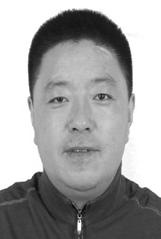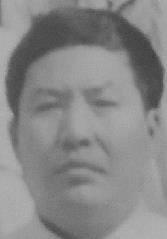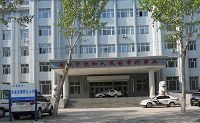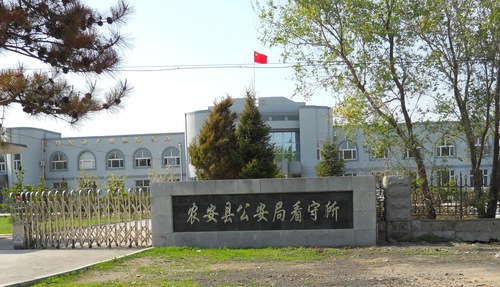Eight Practitioners Sentenced Up to 12 Years—Attorney Files Complaints Against Key Perpetrators
(Minghui.org) Eight practitioners in Nong’an County, Jilin Province were sentenced to up to twelve-year terms on October 11, 2013, by the Nong'an City Court. The families and their attorney were not notified about the hour-long trial. Attorneys have since filed complaints against the key perpetrators.
Five of the practitioners are now detained at the Nong'an County Detention Center, and the rest are held at the No. 3 Detention Center in Changchun, Jilin Province.
Part I: Case Review Part II: Appellant Brief of Mr. Chang Baojun Part III: Complaint issued by Ms. Liu Bixue, Mr. Liu Wei’s Sister Part IV: Complaint issued by Mr. Yang Hongbiao
Part I: Case Review
Officers from the Nong'an Police Department arrested eight practitioners between October 18 and November 3, 2012. In addition to the arrests, the officers ransacked the practitioners' homes and confiscated personal property valued at more than 700,000 yuan (over US$110,000).
The practitioners were tortured during detention. Mr. Liu Wei’s right tibia was broken. Ms. Zhang Guozhen’s left leg developed nervous necrosis, and it was fractured in numerous places.
The practitioner's family members hired an attorney in May 2013. However, Nong'an officials denied all requests for legal counsel. The officials also denied the attorney any access to court documents, which prevented him from defending his clients.
When officials held a trial on October 11, 2013, they refused to notify the practitioners’ families or attorneys. Instead, the officials dispatched over a dozen police vans and nearly 100 police officers to stand guard and prevent any family members from entering the courthouse.
The show trial lasted only about an hour, and the judge failed to notify the practitioners of their basic legal rights. Moreover, the judge did not hear any evidence, and when the practitioners questioned the validity of the hearing, he cut them off.
Despite the rushed trial, these practitioners were still sentenced to long detention terms: Mr. Liu Wei, 12 years; Ms. Zhang Guozhen, 10 years; Mr. Yang Hongbiao, 9 years; Mr. Chang Baojun, 8 years; Ms. Wang Yajuan, 8 years; Mr. Xiu Jixue, 7.5 years; Mr. Su Xiufu, 7 years; and Ms. Yang Weijuan, 7 years.
Although the indictment (document No. 309) was dated October 31, 2013, officials did not notify the practitioners of their sentences. In fact, when Mr. Yang Hongbiao met with his attorneys on November 19, he was unaware that he had been sentenced to a 9-year term.
Given the illegality of what transpired, the attorney filed a complaint against the key perpetrators of the trial.
Part II: Appellant Brief of Mr. Chang Baojun
CHANGCHUN INTERMEDIATE COURT, JILIN PROVINCE
Date: December 5, 2013 Appellant: Chang Baojun, male Birth: February 4, 1970 Profession: Physician
The appellant remains unconvinced by the No. 309 criminal sentence of the Nong'an City People's Court. Article 300 of the criminal code was unlawfully administered: The appellant did not violate any law or take any action of “Using a heretical organization to undermine the implementation of law,” as found within the authority in the court of the first instance. In fact, the appellant’s belief in Falun Gong and its principles of Truthfulness-Compassion-Forbearance is a privilege granted by law, and should be protected.
The appeal is based on the following reasons:
1. The Court of the First Instance Failed to Verify Evidence
The court of the first instance did not check or verify evidence, nor did the court demonstrate any harmful impact of the appellant's behavior and property, nor how the appellant used said behavior and belongings to sabotage the implementation of law.
Furthermore, along with its inability to follow basic legal procedures in verifying evidence, the primary court neglected the appellant's right to defend himself and his freedom of belief.
2. No Appellant Action Has Undermined the Implementation of the Law
A person’s belief is an ideological issue. Moreover, one can only commit a crime by way of one's actions, not one's thoughts. Both unlawful intent and illegal action is necessary for the law to apply to criminal activity. The appellant did not in this way take any action which violated the law or administrative regulations.
a) The court did not provide any evidence of the appellant’s involvement in a heretical organization, such as which heretical organization, its structure, domestic vs. overseas membership, funding, or member title of the appellant in the organization. In addition, no evidence was provided detailing whom the appellant receives orders from, works with, or issues orders to.
b) The court did not provide any evidence detailing how the appellant affected the implementation of the law or administrative regulation, such as which law or regulation was impacted, and the effects and/or consequence of the appellant's actions.
c) There is no correlation between the evidence presented by the court prosecutor and the charge against the appellant. Even if the so-called evidence was verified, it only indicates that the appellant promoted Falun Gong. The prosecutor failed to prove that having Falun Gong materials amounts to being part of a heretical organization. Moreover, the charge was, “Using a heretical organization to undermine the implementation of the law.” The prosecutor could not present Falun Gong as a heretical organization, and could not prove that distributing Falun Gong materials equates to using a heretical organization to undermine the implementation of the law. d) The freedom of belief and religion is protected by the United Nations' Universal Declaration of Human Rights and International Covenant on Civil and Political Rights. China is a signatory of these international conventions. Furthermore, Article 36 of the Chinese Constitution states that “Citizens of the People's Republic of China enjoy freedom of religious belief.” The appellant's freedom of belief is protected by both domestic and international law.
3. No Harm to Society
No actions by the appellant caused any harm to society, nor did it constitute criminal activity.
a) The evidence presented during the trial revealed that practicing Falun Gong presents no harm to society, and the spiritual practice offers no negative impact to Nong'an County, the rest of China proper, or international society. Neither the appellant nor his actions caused any damage to society, freedom, or property. Moreover, the practice itself makes a point not to disturb public order or harm public interest.
b) The appellant had no intention to, and neither did he, harm anyone. He adheres to Falun Dafa's principles of Truthfulness-Compassion-Forbearance, and remains a lawful citizen.
c) The actions of the appellant were peaceful and beneficial for society. Moreover, these actions were lawful under the authority of the Constitution.
4. The First Instance Misapplied the Law
No existing law in China states that it is illegal to practice Falun Gong. Neither does any policy, code, or decree define Falun Gong as an “evil cult.” However, the following types of documents often accused Falun Gong practitioners of criminal activity:
a) Communist Party leaders' speeches and People's Daily commentaries are not law and cannot be used as a basis for conviction.
b) “Resolution of the Standing Committee of the National People's Congress (NPC) of the People's Republic of China on Banning Heretical Cult Organizations, Guarding Against and Punishing Heretic Cult Activities” and Article 300 are regulations and laws which are not in accordance with the Constitution, and are therefore null and without legal basis.
Article 5 of the Chinese Constitution states, “The state upholds the uniformity and dignity of the socialist legal system. No law or administrative or local rules and regulations shall contravene the constitution.”
In addition, Article 36 of the Constitution clearly states that “Citizens of the People's Republic of China enjoy freedom of religious belief.”
Article 300 of China's Criminal Law provides for the basis for prosecution of a person who “organizes and utilizes superstitious sects ... or sabotages the implementation of the state's laws or executive regulations by utilizing superstition.”
c) Legal interpretation of these statutes violates Chinese legislation and the Constitution; therefore such an interpretation cannot be used as a basis for criminal conviction.
Article 8 of Chinese Legislation Law stipulates that policies or punishments that deprive the political rights of a citizen, or compulsory measures and penalties that involve the restriction of personal freedom, can only be established by laws enacted by the NPC or its Standing Committee. In addition, the NPC Standing Committee's “Resolution on Providing an Improved Interpretation of the Law,” adopted in 1981, clarifies the scope of legislative interpretation. It is not permitted for legislative interpretation to step into sectors of legislative establishment.
Article 42 of the Legislation Law stipulates that the power to interpret national law is vested in the Standing Committee of National People's Congress.
However, China's Supreme People's Court and the Supreme People's Procuratorate promulgated their "Explanations ... on Applying Specific Laws to Handle Cases of Organizing and Utilizing Heretical Sects to Commit Crimes,” on October 8-9, 1999.
According to Article 8 and 42 of Chinese Legislation Law, the October explanation broadened the authority of legislative interpretation into the sector of legislative establishment, thereby limiting the citizens' basic rights and freedoms, and thereby violating the Chinese Constitution.
d) In 2000, the CCP Central Committee, State Council, and the Ministry of Public Security jointly issued the “Ministry of Public Security (Notification)” (2000) No. 39, which identified 14 kinds of cults. The Central Committee and State Council documented seven types, and the Ministry of Public Security identified the other seven. Falun Gong was not included on either list.
In addition, the Ministry of Public Security does not constitute the authority to identify cults. Moreover, such a denunciation stands in stark contrast with the limits of the Constitution.
e) The term “cult” is defined according to the field of religion and belief. However, Article 1 of the “Explanation” from the Supreme People's Court and the Supreme People's Procuratorate explained “heretical cult organizations” in Article 300 in the Criminal Law, “Those illegal organizations that have been established under the guise of religion, qigong or other forms, deifying their leading members, enchanting and deceiving others by concocting and spreading superstitious fallacies, recruiting and controlling their members, and endangering society.”
The terms used in this explanation—“under the guise of religion” and “superstitious”—lack clear legal definition. These ambiguous terms give law enforcement personnel the opening to make arbitrary decisions.
The CCP Central Committee, State Council, and the Ministry of Public Security are not legislative organs, nor do they have the authority to enact discriminatory laws against a particular group of people.
Given the facts above, the persecution against the spiritual practice of Falun Gong and its practitioners lacks legal basis and must cease immediately. Furthermore, prosecuting practitioners of Falun Gong based on Article 300 of Chinese Criminal Law disrupts the implementation of the state's laws.
5. Procedures of the First Instance Against the Law
The judge of the first trial deprived the appellant's right to self-defense, ignored accounts of torture during interrogation, and failed to exclude evidence obtained illegally.
The appellant's lawful rights should have been protected by the Constitution. The correct judgment of this case concerned all citizens' freedom of belief. The appellant hopes that the second instance will uphold justice and find him innocent based on the Constitution.
Part III: Complaint Issued by Ms. Liu Bixue, Mr. Liu Wei’s Sister
Plaintiff(s): Liu Bixue, born in 1964, resident of Nong'an Township, Nong'an County
Defendant(s): Tang Ke (first defendant), chief of the Nong'an County National Security Division; Guo Qingxi (second defendant), deputy chief justice of the Nong'an County Criminal Court
Offenses: First defendant: Illegal detention, torture, intentional injury, and appropriation of Mr. Liu Wei's property. Second defendant: Depriving the freedom of belief and the right of legal representation and appeal.
Date: December 5, 2013
The accusations are based on the following facts:
1. A dozen armed police officers from the Fifth Squad of the Nong'an County Criminal Police and Domestic Security Division broke into Liu Wei's home at around 8:00 p.m. on November 2, 2012. Without presenting a warrant, they searched Mr. Liu's home and arrested him. Mr. Liu's legs were bound, and he was interrogated at the Fifth Squad that night.
Interrogators beat Mr. Liu's legs with a pickaxe handle, ripped his clothes off, doused him with cold water, and held him under currents of cold air. As soon as the water dried, they poured more water on him and slapped him with wet towels.
They put the pickaxe between his back and arms, and lifted the pointed end of the pickaxe toward his neck. When Mr. Liu was about to suffocate, they loosened the pickaxe a little to keep him from passing out. This torture was repeated throughout the evening.
Tang Ke, chief of the Nong'an County National Security Division, and two other police officers, conducted the interrogation. One of them had the badge number 140604.
2. Tang Ke led a group of police officers to interrogate Mr. Liu and an elderly female Falun Gong practitioner from 9:00 a.m. to 7:00 p.m. on November 6, 2012. By the time Mr. Liu was dragged back into his cell, his face was bruised and swollen. One of his legs was broken, and his skin was black from knee to toe.
The elderly female practitioner sustained a broken leg and ribs. She had to receive treatment in a hospital for a month, and she still cannot walk today. Despite her condition, however, she was sentenced to ten years in prison.
3. Tang Ke and his group broke into Mr. Liu's house again on November 3. No one was at home, so they confiscated some of Mr. Liu's property, including over 100,000 yuan in cash. The documents detailing the home search failed to mention anything about the cash. Weeks after the initial search, the search warrant was finally created on November 17.
4. After Mr. Liu refused to give in, Tang Ke had Mr. Liu's child taken from school. The child was interrogated and emotionally abused.
5. The second defendant violated Mr. Liu Wei's right to legal representation and obstructed the defense attorneys' right to perform his legal duties.
Mr. Liu's family and other practitioners hired attorneys from Beijing to defend them. However, Guo Qingxi, deputy chief justice of the Nong'an County Criminal Court, refused to pass paperwork to these attorneys, saying that no out-of-town attorneys were allowed to mount a defense in Nong'an. Guo notified the Nong'an County Detention Center and told them not to allow any attorneys to see Mr. Liu. Guo, claiming it was “a part of [working in] Nong'an,” and quipped, “Feel free to file a complaint against me!”
On numerous occasions Mr. Liu's family requested the trial be heard, but Guo refused to approve the requests. The trial was finally held without notification at the Nong'an County Courthouse on October 11, 2013. A nearly 100-meter-long security line was set up outside the court. A large number of police officers, armed police, police cars, and firetrucks were deployed to block access to the courthouse. Due to this, Mr. Liu's family was unable to get close to the courthouse.
The verdict was dated October 31, 2013, but Mr. Liu did not receive the verdict until November 21, 2013.
The actions stated above clearly violate the United Nations Convention against Torture and Other Cruel, Inhuman, or Degrading Treatment or Punishment; the Chinese Constitution; and Criminal Law.
The defendants have violated Article 238, 248, 251 of Chinese Criminal Law. Their actions constitute crimes against humanity, genocide, torture, depriving the freedom of belief, illegal detention, and the exploitation of private property.
We request an investigation of this case and the release of innocent Falun Gong practitioners including Mr. Liu Wei.
 Tang Ke, head of Nong'an County National Security Division
Tang Ke, head of Nong'an County National Security Division
 Guo Qingxi, deputy chief justice of Nong'an County Criminal Court
Guo Qingxi, deputy chief justice of Nong'an County Criminal Court
Part IV: Complaint Issued by Mr. Yang Hongbiao's Legal Agent
Plaintiff Agent: Tang Tianhao, attorney of Yuanxing Law Firm of Chongqing
Plaintiff(s): Yang Hongbiao, born on December 6, 1972; resident of Beiguan Village, Nong'an Township, Nong'an County
Defendant(s): Li Qingguo, director of Nong'an County Detention Center; officer Wang Zhanliang, et. al., of the Nong'an County Police Department
Date: November 24, 2013
The accusations are based on the following facts:
Four men broke into my home on November 3, 2012. They claimed to be from the Nong'an County Domestic Security Division, but they were in plain clothes, and refused to show any identification. They confiscated my laptop computer and seven books. They then took me to the Nong'an County Police Department. I was handcuffed and tied to a chair. One of them poured water on me and slapped me many times. About every half hour, they took turns hitting my head and body, and used cigarettes to burn my nostrils. They also refused to let me to eat, sleep, or use the restroom.
I was sent to the Nong'an County Detention Center at around midnight. Li Xingguo, the director of the center, looked drunk at that time, and he beat Falun Gong practitioners, including Liu Wei, Chang Baojun, Xiu Jixue, Zhang Guozhen (female), and myself.
Officer Wang Zhanliang and another police officer took me to the Gucheng Police Station about a week later, where they beat me with batons. Wang burned my neck and stomach with a cigarette lighter, and he handcuffed my hands behind my back and lifted the handcuffs to a torturous position. This left permanent scars on my wrists. The other police officer kept beating my legs, body, back, and arms with a baton. He also hit my legs with a pickaxe handle.
Article 234 of the Criminal Law stipulates that whoever intentionally inflicts bodily harm on another person shall be sentenced to a fixed-term imprisonment of less than three years, criminal detention, or control and surveillance.
Article 247 stipulates that a judicial official who extracts a confession from a criminal suspect or defendant by torture, or extracts testimony from a witness by force, shall be sentenced to a fixed-term imprisonment of less than three years or criminal detention. Where another person's injury, disability, or death are caused, he/she shall be convicted and face heavier penalties in accordance with the provisions of Article 234 and 232 or this law.
Article 248 of the Criminal Law stipulates that a staff member of a prison, criminal detention center, custody center, or other supervisory and administration organs who beat, abuse, or use violence against a prisoner or detainee shall, where the circumstances are serious, be sentenced to a fixed-term imprisonment of less than three years or criminal detention. Where the circumstances are particularly serious, he/she shall be sentenced to a fixed-term imprisonment of more than three years and less than ten years. Where another person's injury, disability, or death are caused, he/she shall be convicted and face heavier penalties in accordance with the provisions of Article 234 and 232 or this law.
Li and Wang's intentional injury and torturous interrogation of the plaintiff was in direct violation of the articles of Criminal Law stated above. The appellant requests that disciplinary inspection departments, Procuratorial organs, and the People's Congress uphold justice.

